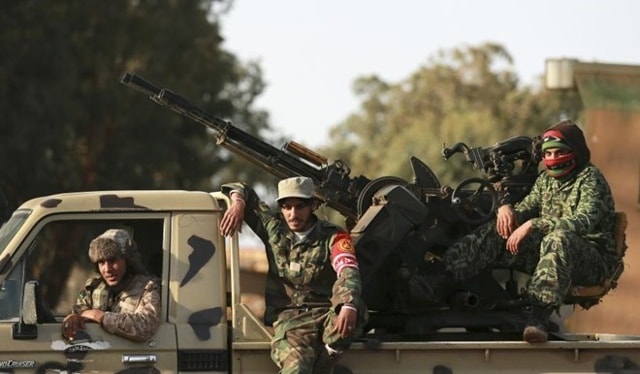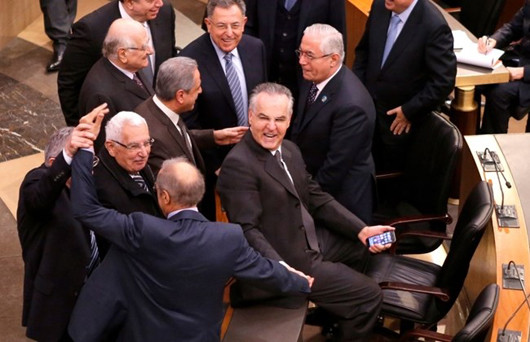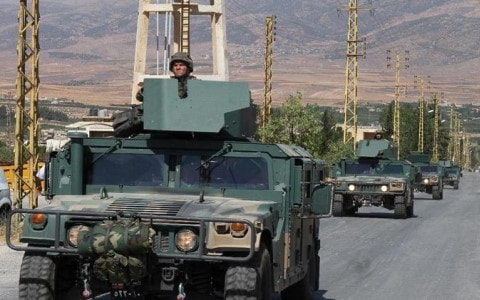Deep divisions in the Middle East
(Baonghean) - The division in the Middle East is getting deeper as the relationship between the Gulf Arab countries and Lebanon has just appeared with new tensions. The Saudi Arabian Foreign Ministry has called on its citizens to leave Lebanon and advised against traveling to this country, and announced the suspension of providing a $4 billion military aid package to Lebanon. After that, two Gulf allies of Saudi Arabia, the United Arab Emirates (UAE) and Bahrain, banned their citizens from traveling to Lebanon. The UAE Ministry of Foreign Affairs and International Cooperation even decided to reduce the number of diplomats working in Lebanon.
Explaining the moves, Saudi Arabia, the largest of the Gulf states, said that “Lebanon’s recent stance is not in line with the bilateral relationship.” A Saudi official, who requested anonymity, said Riyadh was “comprehensively reviewing” its relationship with the Beirut government.
 |
| Lebanese Army. (Source: Reuters) |
The official also stressed that Lebanon did not join the Arab League and the Organization of Islamic Cooperation in opposing the attacks on Saudi Arabia's diplomatic missions in Iran last month. Analysts say Saudi Arabia may have seen Lebanon as leaning toward Iran as opposed to it.
Why?
In fact, the difference in the number of Sunni and Shi'ite Muslims in Lebanon is not large, and the number of Christians in this country is much larger than those two Muslim sects. The division of power in key leadership positions is considered to have a significant impact on Lebanon's foreign policy. In recent years, Lebanon has been considered to have a relatively neutral and moderate foreign policy in the context of the deepening sectarian conflict between the Sunni and Shi'ite Muslims in the Middle East.
However, with its important geographical location, Lebanon cannot be excluded from the vortex of instability in this region. For many years, Lebanon has become the main front in the conflict between Riyadh and Tehran when these two countries invested billions of dollars to support the Lebanese presidential candidate they supported. However, thanks to the power-sharing agreement, the Lebanese State has been seen for many years as always trying to coordinate its relations with Iran and Saudi Arabia, avoiding leaning towards either side.
 |
| Lebanese parliamentarians chat during a session on February 8. Photo: Dailystar |
However, the relative neutrality of the Lebanese government cannot help but be influenced by the stance of the Hezbollah movement. Although considered a terrorist organization by Western countries and Israel, for the majority of Lebanese people, the Hezbollah movement was instrumental in driving Israel out of southern Lebanon in 2000.
According to public opinion, Hezbollah is the largest political party, has the most effective armed forces and media tools in Lebanon, and has a wide influence on the people of this country. Meanwhile, the Hezbollah movement is said to be fighting in Syria to support the government of President Bashar Al Assad.
Analysts assess that, because the Lebanese government cannot do anything about the Hezbollah movement's stance, Saudi Arabia and the Gulf Arab countries have considered Lebanon as not supporting them in their confrontation with Iran and the Syrian government.
Message to allies
In that context, the “confrontation” between the two factions on the Syrian battlefield is increasingly fierce. Iran and the Hezbollah movement are effectively supporting the Syrian Government army, while Saudi Arabia openly supports the opposition forces in Syria and does not hide its intention to overthrow the Al Assad regime.
It seems that the sectarian conflict between the Sunni and Shi'ite Muslims is increasingly pushing the Middle East into a clear division as countries compete to "attract" allies. Saudi Arabia has the advantage of gathering a large number of Arab countries into its Alliance, but Iran is not far behind. Since the embargo was lifted thanks to the historic nuclear deal, Iran has also been expanding its influence in the Middle East with its impact on Iraq and Lebanon.
 |
| Lebanese army tanks. Photo: AFP |
According to analysts, the fact that Saudi Arabia and the Gulf countries have jointly “boycotted” Lebanon shows that these countries do not accept any country in the Middle East leaning towards Iran. Saudi Arabia and its allies in the region also want to send a warning to some countries that are still hesitant about whether to follow their stance or not.
Lebanon is a member of the Arab League, so the Gulf Arab countries' downgrading of relations with this country is showing the deep division in the Middle East. The situation in this region will become increasingly complicated when even countries with relatively moderate views like Lebanon are being dragged into the confrontation between two opposing factions, one led by Iran and the other by Saudi Arabia. Therefore, the prospect of reconciliation and peaceful coexistence between sects and peoples in the Middle East will become increasingly distant./.
Nguyen Cao Bien
| RELATED NEWS |
|---|
